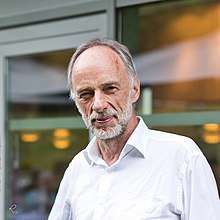Reinhard Wilhelm
Reinhard Wilhelm (born June 5, 1946) is a German computer scientist.
Reinhard Wilhelm | |
|---|---|
 Reinhard Wilhelm, 2014 | |
| Born | 5 June 1946 |
| Alma mater | University of Münster, Stanford University, Technical University Munich |
| Known for | compiler technology |
| Awards | Konrad Zuse Medal (2009) Merit Cross on Ribbon (2010) ACM Distinguished Service Award (2011) |
| Scientific career | |
| Fields | Computer Scientist |
| Institutions | Saarland University |
Life and work
Wilhelm was born in Deutmecke, today part of the municipality of Finnentrop, Westphalia. He studied math, physics and mathematical logic at University of Münster and computer science at Technical University Munich and Stanford University. He finished his PhD at TU Munich in 1977. In 1978, he obtained a professorship at Saarland University, where he led the chair for programming languages and compiler construction until his retirement in 2014. In addition, Wilhelm has held the post of scientific director of the Leibniz Center for Informatics at Schloss Dagstuhl from its inception in 1990 until 2014. Today he is a professor emeritus at Saarland University.
Wilhelm is one of the co-founders of the European Symposium on Programming (ESOP) and the European Joint Conferences on Theory and Practice of Software (ETAPS). The European Association for Programming Languages (EAPLS) goes back to his idea to found an organization for advancing research on programming languages and programming systems.[1] In 1998, he founded AbsInt, a research spin-off that offers software for verification of time-critical properties of embedded systems, used for example for certification of the time-critical systems inside the Airbus A380.[2]
Wilhelm's research focuses on programming languages, compiler construction, static program analysis and embedded real time systems, but also includes animation and visualization of algorithms and data structures. Wilhelm discovered connections between code selection and the theory of regular tree automata, which is relevant for code generation using tree automata. He is one of the co-developers of the MUG1, MUG2 and OPTRAN compiler generators, which are based on attribute grammars. Together with Ulrich Möncke, he proposed grammar flow analysis as a generalization of interprocedural data flow analysis. He invented a popular shape analysis based on three-valued logic together with Mooly Sagiv and Tom Reps.
Wilhelm is co-author of the book Compiler Construction, which teaches compilers not only for imperative languages, but for object-oriented, functional and logical ones as well and stresses theoretical foundation. It is available in German and French, too.
Wilhelm became a fellow of the ACM in 2000 for his research on compiler construction and program analysis and his work as a scientific director of the LZI.[3] The TU Darmstadt and the Fraunhofer-Institut für Graphische Datenverarbeitung awarded him with the Alwin-Walther medal in 2006. In 2007 the French Ministry of Education and Research awarded him with the Gay-Lussac-Humboldt prize for his contributions to science and his achievements in German–French cooperation in research and education.[4] He became a member of the European academy of sciences (Academia Europaea) in 2008.[5] October of the same year he was awarded an honorary doctorate of the RWTH Aachen.[6] In December, he obtained an honorary degree of Tartu University.[7] In September 2009, he was awarded the Konrad Zuse Medal for his achievements in research and education with respect to compiler construction, real time analysis of programs and his service as scientific director of the LZI/Schloss Dagstuhl.[8] In 2010 he was awarded the Cross of the Order of Merit of the Federal Republic of Germany and the ACM Distinguished Service Award.[9] He received the Test-of-Time award at the international conference ESWEEK 2019 for the long term impact of his research on execution time bounds.[10] In 2020, the IEEE Technical Committee on Real Time Systems awarded him their Achievement and Leadership Award.[11]
List of books
- Jacques Loeckx, Kurt Mehlhorn, Reinhard Wilhelm: Foundations of Programming Languages 1989
- Reinhard Wilhelm: Informatics - 10 Years Back. 10 Years Ahead. Springer 2001
- Reinhard Wilhelm, Helmut Seidl: Compiler Design: Virtual Machines, Springer 2011
- Helmut Seidl, Reinhard Wilhelm, Sebastian Hack: Compiler Design: Analysis and Transformation, Springer 2011
- Helmut Seidl, Reinhard Wilhelm, Sebastian Hack: Compiler Design: Syntactic and Semantic Analysis, Springer 2011
- Reinhard Wilhelm: Einsichten eines Informatikers von geringem Verstande – Glossen aus dem Informatik Spektrum. Springer Fachmedien, Wiesbaden 2020, ISBN 978-3-658-28385-8.
Literature
- Thomas Reps, Mooly Sagiv, Jörg Bauer: An Appreciation of the Work of Reinhard Wilhelm. Program Analysis and Compilation, Theory and Practice (Springer, 2007), Lecture Notes in Computer Science Volume 4444.
References
- "EAPLS: What is EAPLS".
- "AbsInt-Firmenprofil".
- "About ACM Fellows". awards.acm.org. Retrieved November 14, 2019.
- https://web.archive.org/web/20090321212025/http://www.uni-saarland.de/de/medien/2007/01/1170067449
- "Zwei Saarbrücker Informatiker in Academia Europaea aufgenommen".
- "RWTH AACHEN UNIVERSITY - Rheinisch-Westfaelische Technische Hochschule - English".
- "89th Anniversary of UT as an Estonian-Language University". December 2008.
- "Reinhard Wilhelm aus Saarbrücken erhält Konrad-Zuse-Medaille - Höchste Informatik-Auszeichnung wird in Lübeck verliehen". idw-online.de. Retrieved November 14, 2019.
- "Archived copy". Archived from the original on 2012-04-02. Retrieved 2011-09-29.CS1 maint: archived copy as title (link)
- Zeitung, Saarbrücker. "Saar-Universität: Internationaler Preis für Informatiker". Saarbrücker Zeitung. Retrieved November 14, 2019.
- https://site.ieee.org/tcrts/2020/04/30/tcrts-2020-outstanding-technical-achievement-and-leadership-award/